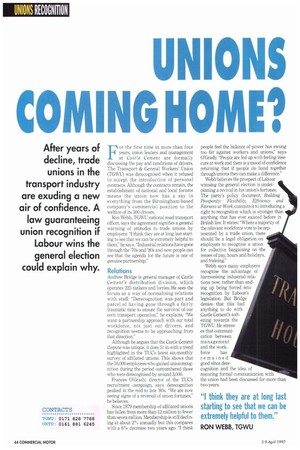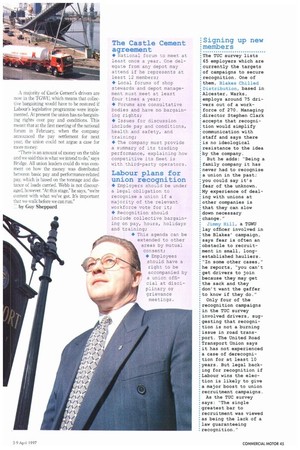UNIO NS COMING HOM
Page 46

Page 47

If you've noticed an error in this article please click here to report it so we can fix it.
For the first time in more than four years, union leaders and management at Castle Cement are formally discussing the pay and conditions of drivers. The Transport & General Workers' Union (TGWU) was derecognised when it refused to accept the introduction of personal contracts. Although the contracts remain, the establishment of national and local forums means the union now has a say in everything from the Birmingham-based company's commercial position to the welfare of its 300 drivers.
Ron Webb, TGWU national mad transport officer, says the agreement signifies a general warming of attitudes to trade unions by employers: "I think they are at long last starting to see that we can be extremely helpful to them," he says. "Industrial relations have gone through the '70s and '80s and now people can see that the agenda for the future is one of genuine partnership."
Andrew Bridge is general manager of Castle Cement's distribution division, which operates 225 tankers and lorries. He sees the forum as a way of normalising relations with staff: "Derecognition was part and parcel of having gone through a fairly traumatic time to ensure the survival of our own transport operation," he explains. "We want a partnership approach with our total workforce, not just our drivers, and recognition seems to be approaching from that direction."
Although he argues that the Castle Cement dispute was unique, it does fit in with a trend highlighted in the TUC's latest six-monthly survey of affiliated unions. This shows that the 16,000 employees who gained union recognition during the period outnumbered those who were derecognised by around 3,000.
Frances O'Grady, director of the TUC's recruitment campaign, says derecognition peaked in the mid to late '808. "We are now seeing signs of a reversal of union fortunes," he believes.
Since 1979 membership of affiliated unions has fallen from more than 12 million to fewer than seven million. Membership is still declining at about 2% annually but this compares with a 6% decrease two years ago. "I think people feel the balance of power has swung too far against workers and unions," says O'Grady. "People are fed up with feeling insecure at work and there is a mood of confidence returning that if people do band together through unions they can make a difference."
Webb believes the prospect of Labour winning the general election is underpinning a revival in his union's fortunes. The party's policy document, Building Prosperity: Flexibility, Efficiency and Fairness at Work, commits it to introducing a right to recognition which is stronger than anything that has ever existed before in British law. It states: "Where a majority of the relevant workforce vote to be represented by a trade union, there should be a legal obligation on employers to recognise a union for collective bargaining on the issues of pay, hours and holidays, and training."
Webb says many employers recognise the advantage of harmonising industrial relations now, rather than ending up being forced into recognition by Labour's legislation. But Bridge denies that this had anything to do with Castle Cement's softening towards the TGWU. He stresses that communication between management and the work force has remained good since derecognition and the idea of restoring formal communication with the union had been discussed for more than two years. A majority of Castle Cement's drivers are now in the TGWU, which means that collective bargaining would have to be restored if Labour's legislative programme were implemented. At present the union has no bargaining rights over pay and conditions. This meant that at the first meeting of the national forum in February, when the company announced the pay settlement for next year, the union could not argue a case for more money.
"There is an amount of money on the table and we said this is what we intend to do," says Bridge. All union leaders could do was comment on how the money was distributed between basic pay and performance-related pay, which is based on the tonnage and distance of loads carried. Webb is not discouraged, however. "At this stage," he says, "we're content with what we've got. It's important that we walk before we can run."
by Guy Sheppard • National forum to meet at least once a year. One delegate from any depot may attend if he represents at least 12 members; • Local forums of shop stewards and depot management must meet at least four times a year; • Forums are consultative bodies and have no bargaining rights; • Issues for discussion include pay and conditions, health and safety, and training; • The company must provide a summary of its trading performance, explaining how competitive its fleet is with third-party operators.
• Employers should be under a legal obligation to recognise a union if a majority of the relevant workforce vote for it; • Recognition should include collective bargaining on pay, hours, holidays and training; • This agenda can be extended to other areas by mutual consent; • Employees should have a right to be accompanied by a union official at disciplinary or grievance meetings.
The TUC survey lists 65 employers which are currently the targets of campaigns to secure recognition. One of them, Blakes Chilled Distribution, based in Alcester, Warks, employs around 75 drivers out of a workforce of 270. Managing director Stephen Clark accepts that recognition would simplify communication with staff and says there is no ideological resistance to the idea by the company.
But he adds: 'Being a family company it has never had to recognise a union in the past; you could say it's fear of the unknown. My experience of dealing with unions at other companies is that they can slow down necessary change."
Jimmy Hill, a TGWU lay officer involved in the Slakes' campaign, says fear is often an obstacle to recruitment in small, longestablished hauliers. "In some other cases," he reports, "you can't get drivers to join because they may get the sack and they don't want the gaffer to know if they do."
Only four of the recognition campaigns in the TUC survey involved drivers, suggesting that recognition is not a burning issue in road transport. The United Road Transport Union says it has not experienced a case of derecognition for at least 10 years. But legal backing for recognition if Labour wins the election is likely to give a major boost to union recruitment campaigns.
As the TUC survey says: 'The single greatest bar to recruitment was viewed as being the lack of a law guaranteeing recognition."




































































































